 Petzlover
Petzlover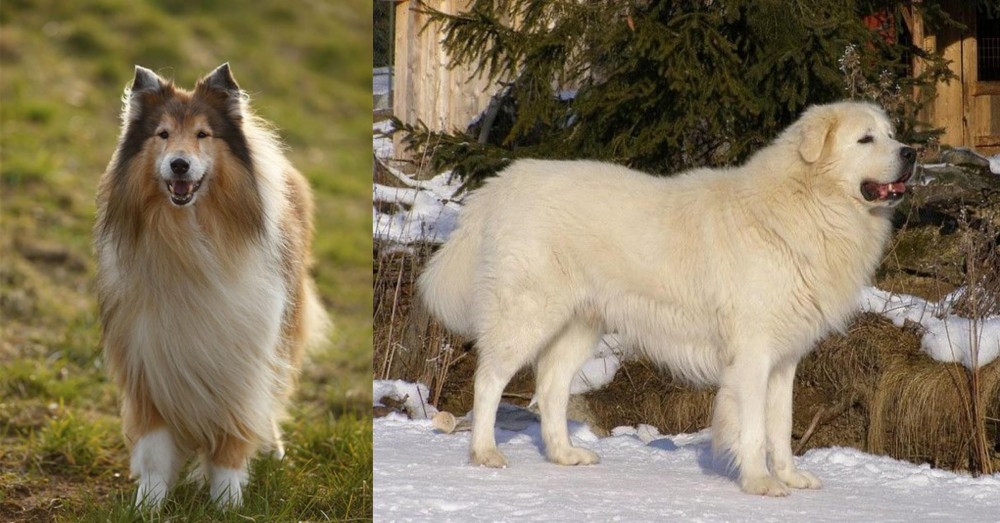 Collie is originated from United Kingdom but Slovak Cuvac is originated from Slovakia. Collie may grow 9 cm / 3 inches shorter than Slovak Cuvac. Collie may weigh 15 kg / 33 pounds lesser than Slovak Cuvac. Both Collie and Slovak Cuvac has almost same life span. Both Collie and Slovak Cuvac has almost same litter size. Both Collie and Slovak Cuvac requires Moderate Maintenance.
Collie is originated from United Kingdom but Slovak Cuvac is originated from Slovakia. Collie may grow 9 cm / 3 inches shorter than Slovak Cuvac. Collie may weigh 15 kg / 33 pounds lesser than Slovak Cuvac. Both Collie and Slovak Cuvac has almost same life span. Both Collie and Slovak Cuvac has almost same litter size. Both Collie and Slovak Cuvac requires Moderate Maintenance.
 The Collie is a herding dog from Scotland and is also known by other names such as Rough Collie or Lassie Collie.
The Collie is a herding dog from Scotland and is also known by other names such as Rough Collie or Lassie Collie.
The first Collies used to be more in size as today’s Border Collies and they were also essentially black. Queen Victoria stepped in to save the Collie from obscurity, bringing some back to England where their popularity soared.
The looks started changing as they were bred and in 1860 they were shown at a dog show in Birmingham, England as ‘Scotch Sheep Dogs’.Later on the sable coat color was introduced.
In 1879 the first Collie was imported to the United States and a club for the dog breed was formed in 1886.
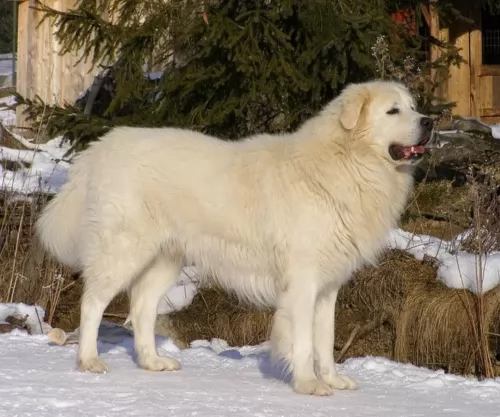 Looking quite a bit like the Pyrenean Mountain Dog, the Slovak Cuvac is a large dog that has served as a guard dog. The Slovensky Cuvac is still used on sheep farms as he isn’t afraid of wolves and bears and will take them on if needs be.
Looking quite a bit like the Pyrenean Mountain Dog, the Slovak Cuvac is a large dog that has served as a guard dog. The Slovensky Cuvac is still used on sheep farms as he isn’t afraid of wolves and bears and will take them on if needs be.
Records of this dog have been kept since the 17th century already, and when the breed started dying out, a certain Dr Antonin Hruza put in efforts to revive the dog.
The registered breeding of the Slovensky Cuvac was established in Czechoslovakia and a club for the dog was established in 1933. A written standard was established in 1964. The dog is not recognized by the Fédération Cynologique Internationale.
 The modern Collie is a medium to large sized dog that stands at 51 – 61cm and weighs between 20 – 29kg. You could say that the popularity of the Collie grew because of the dog Lassie, a Rough Collie dog in the film ‘Lassie Come Home’. People who saw this film learned what a wonderful pet the dog could be.
The modern Collie is a medium to large sized dog that stands at 51 – 61cm and weighs between 20 – 29kg. You could say that the popularity of the Collie grew because of the dog Lassie, a Rough Collie dog in the film ‘Lassie Come Home’. People who saw this film learned what a wonderful pet the dog could be.
The Collie has two looks – the full coat which is known as the Rough Collie and the shorter coated Collie known as the Smooth variety. The coat comes in different colors but is essentially tri-colored in white, tan and black tips. The Collie has erect ears and a long, feathery tail.
Temperament of a dog is affected by a number of factors, including lifestyle of owners, heredity as well as whether the dog had training and socialization.
The Collie is a good-natured, friendly dog with no aggressiveness in him. He adapts well to city and country life, so long as he is with his human family, but he will need lots of exercise.
He will do well with training and socialization, turning into an even more splendid pet than he already is. He loves the children in the home and loves playing with them and watching over them. The Collie is intelligent and loyal and is easily trained.
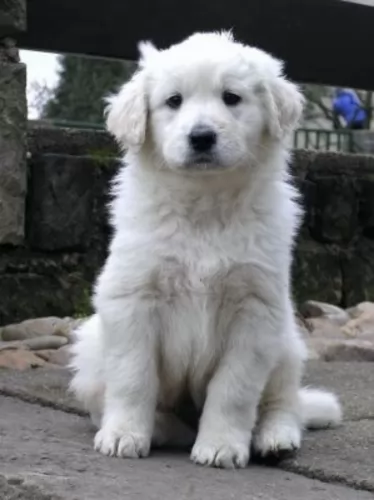 This is a large dog standing at between 59 and 70cm in height and weighing between 31 and 44kg.
This is a large dog standing at between 59 and 70cm in height and weighing between 31 and 44kg.
The neck is broad and has quite a bit of fur around it. The head is large, the eyes dark brown, the double coat is white and thick and medium length. The eyes are brown, the ears medium length and floppy and the tail long and furry.
This is a robust dog, used to spending time outdoors keeping watch over livestock. When he is invited into the home, he is gentle and well behaved, more so when he has been trained and socialized.
He is loving and loyal towards his human family and will get on well with children in the home. He isn’t the brightest dog but you can still have him trained.
 Your Collie is an intelligent dog who will need physical exercise as well as mental stimulation too, otherwise he can develop some destructive behavior patterns that could be avoided just by seeing to his exercise needs.
Your Collie is an intelligent dog who will need physical exercise as well as mental stimulation too, otherwise he can develop some destructive behavior patterns that could be avoided just by seeing to his exercise needs.
He is easy to train and is a sensitive dog, wanting to learn and wanting to please.
A well trained Collie makes a wonderful pet. He is such a loyal dog that he will go to the ends of the earth for his owner, and guarantees to be every bit as affectionate, brave and loyal as the film-star dog, Lassie.
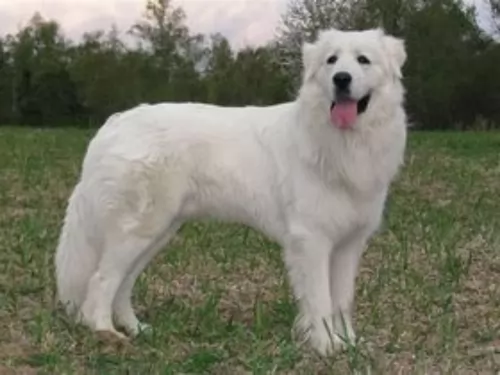 Your playful Slovak Cuvac is an affectionate dog, wanting nothing more than to be totally involved in his family’s life.
Your playful Slovak Cuvac is an affectionate dog, wanting nothing more than to be totally involved in his family’s life.
He is social and loving and also makes an excellent watchdog. He’s a big dog so think carefully before you bring him into your home. Many dog owners like the look of a big dog and forget that it costs a lot of money to feed a big dog and to pay for vet fees.
This big dog is wanting to be part of your family and not just to be discarded when you find that he is costing you too much.
 The Collie is a healthy dog breed generally, but just like with all other dogs, they are also prone to certain health conditions. It’s not to say that your Collie will get these diseases, but it can be beneficial to you and your pet’s health to be aware of them if you’re looking at the Collie as a pet.
The Collie is a healthy dog breed generally, but just like with all other dogs, they are also prone to certain health conditions. It’s not to say that your Collie will get these diseases, but it can be beneficial to you and your pet’s health to be aware of them if you’re looking at the Collie as a pet.
This is a condition where the skin of the nose peels and oozes and left untreated, it can be painful for your pet and could even lead to cancer.
This is an inherited eye disease that can actually lead to blindness. When certain parts of the eye don't develop properly it can lead to CEA - a genetic disease found in Collies as well as other dog breeds. The disease is also known as Choroidal Hypoplasia and brings about changes and abnormalities in the eye.
This is an abnormal formation of the hip socket and certainly dogs with hip dysplasia should never be bred as it can lead to pain and lameness.
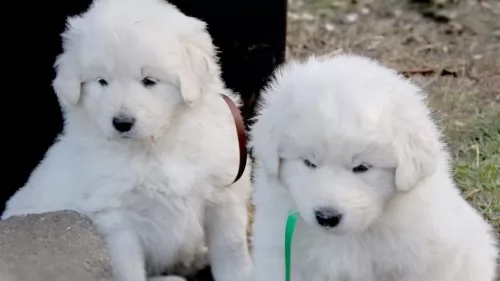 This is a healthy dog breed, but as with many large dogs, hip dysplasia is a threat. Hip dysplasia is always reason for concern as the condition can reduce a dog’s quality of life.
This is a healthy dog breed, but as with many large dogs, hip dysplasia is a threat. Hip dysplasia is always reason for concern as the condition can reduce a dog’s quality of life.
It is distressing seeing your once active pet becoming reluctant to play and move around.
Canine hip dysplasia is a common skeletal condition. It can strike any size dog but is more prevalent with large dogs. The ball and socket of the hip doesn’t fit properly and deterioration sets in resulting in loss of function of the joint.
You will need to get your dog to the vet who will perform a physical exam and discuss treatments to alleviate the pain your dog can experience.
 The Collie will need grooming because of his long hair, and you will need to brush it at least twice a week to rid it of loose hairs and to keep it free from tangles. This is especially important if you live in the country and he leads an active lifestyle running through fields.
The Collie will need grooming because of his long hair, and you will need to brush it at least twice a week to rid it of loose hairs and to keep it free from tangles. This is especially important if you live in the country and he leads an active lifestyle running through fields.
Keep a constant check on your Collie’s ears because dirt build-up can lead to an ear infection. Your vet can advise you on how to clean your dog’s ears. Make sure you have your Collie’s nails trimmed.
To cater for your Collie’s size and activity levels, make sure to feed him good food that meets his nutritional needs. Protein is the most important nutritional need for dogs, and apart from feeding your dog quality kibble, protein should also come from raw, animal-based sources such as meat, fish and poultry.
You can also include some cooked brown rice, vegetables and cooked chicken to provide variety. Make sure he always has fresh, cool water available.
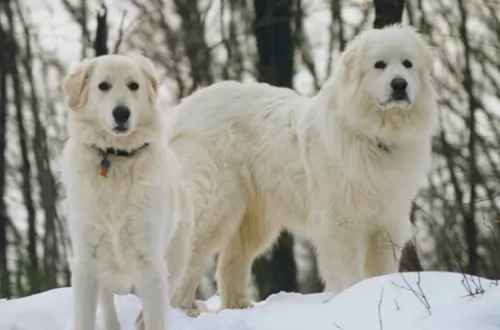 ◆The thick white hair will require regular grooming to keep it free from burrs and dirt. He sheds so this brushing will help him to look more groomed.
◆The thick white hair will require regular grooming to keep it free from burrs and dirt. He sheds so this brushing will help him to look more groomed.
◆The nails should be trimmed regularly and the ears too should be checked for redness and infection. You’ll need to look inside his mouth too as a rotting tooth can cause havoc within his body. A rotten tooth can also cause him tremendous pain and he has no way of telling you this.
◆Have your pet spayed or neutered if you don’t want any puppies. This is better for your dog’s health in the long run too.
◆Your Slovak Cuvac is going to need a lot of exercise as they have always been used to roaming the mountains watching over livestock.
◆This is a big dog so if you buy commercially manufactured food, make sure its for large, energetic dogs. There are good commercially manufactured dog foods on the market – just make sure you buy the best one for your pet to enhance health and longevity.
Try and give him some home made food too. Healthy food which won’t jeopardise his digestion is boiled chicken, brown rice or pasta and spinach, sweet potatoes and carrots. These can all be chopped up and small portions mixed into the dry kibble twice a week as a treat.
Try and include some raw meat occasionally. Your dog will thank you for not giving him exotic people foods which can do lots of harm. Ensure there is always a bowl of fresh, cool water within his reach.